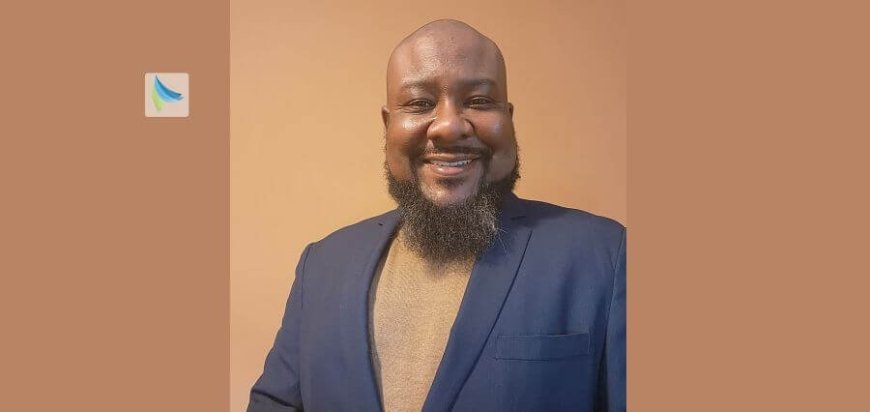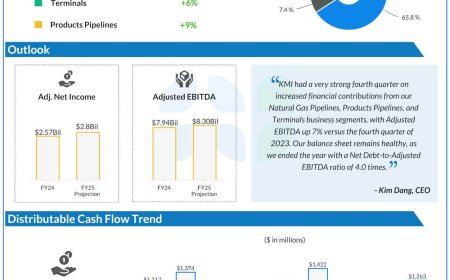Eric Smith: Creating a Culture of Excellence in Investment Operations
Philanthropy Through Finance! Investment management is a key component of maintaining and growing wealth in today’s financial sector. It involves the professional management of assets to meet specific investment goals for the benefit of investors. As the global economy evolves, the practice of investment management has grown more sophisticated, integrating advanced data analytics, risk management, […] The post Eric Smith: Creating a Culture of Excellence in Investment Operations appeared first on Insights Success.

Philanthropy Through Finance!
Investment management is a key component of maintaining and growing wealth in today’s financial sector. It involves the professional management of assets to meet specific investment goals for the benefit of investors. As the global economy evolves, the practice of investment management has grown more sophisticated, integrating advanced data analytics, risk management, and sustainable investing practices. Investment managers are increasingly tasked with balancing traditional financial returns with broader social and environmental considerations, making the field both challenging and forward-looking. The discipline continues to adapt, utilizing technology and innovative strategies to navigate market fluctuations and meet investor expectations.
Eric Smith, former Head of Investment Operations and Co-Chair of the Operations Committee, is a leader who has significantly influenced the direction of this industry. Known for his unwavering integrity, intellectual curiosity, and dedication to continuous improvement, Eric has built a reputation for cultivating high-performing teams that deliver exceptional results. His leadership approach, centered on trust and collaboration, has transformed the operational efficiency of the teams he has led, helping to create environments where innovation and excellence thrive. His personal commitment to authenticity and empathy has also played an important role in his success, ensuring that his professional and personal values align harmoniously in his decision-making process.
Cascade Asset Management Company, where Eric previously held a leadership role, is known for its meticulous asset management and commitment to operational excellence. The firm has been influential in managing large-scale financial operations, particularly in supporting philanthropic missions. Cascade’s focus on precision and execution has earned it a reputation for delivering exceptional results, ensuring that financial assets are managed with care and strategic foresight. The company’s alignment with global philanthropic efforts further highlights its role in preserving wealth and in making a meaningful impact on a broader scale.
Let’s delve into Eric’s strategic leadership journey in investment management:
Supporting a Global Mission
When the recruiter reached out to Eric, he was intrigued by the opportunity to develop a data management function again, as it was something he had done before. The opportunity to work for Bill Gates was certainly a plus for him. Generationally, he grew up with Bill Gates as the richest person on earth during his teens and through his twenties, into age thirty.
So, there was a “pop culture” phenomenon almost associated with the opportunity. What also increased the distinction, though, was the ability to support the mission of the Bill and Melinda Gates Foundation Trust. Knowing that the daily work they do would be helpful in assuring that this global foundation would be able to fund its programs and continue to have a positive impact throughout the world was a “no-brainer” for him.
The Impact of Trust in Teams
He distinctly remembers reading Patrick Lencioni’s “The Five Dysfunctions of a Team: A Leadership Fable.” It sounds dramatic, but it changed his life. Not only did it resonate with him, but it also taught him. The emotional connection and the learning opportunity combined for a profound change. He recalls being in situations where the leadership team was not as effective as possible.
Decision-making wasn’t optimal; communication wasn’t optimal; psychological safety certainly wasn’t felt. Consequently, they were operating at suboptimal levels. The first dysfunction – Absence of Trust – resonated with him in a visceral way. As a growing leader, there were many powerful insights in this book that he carried forward.
He has recommended the book many times to colleagues because of the profound impact it had on him. Some of his key memories from the book include:
“If you knew how to do what I am trying to do, you wouldn’t need me, right?”
This harkens to Steve Jobs’s famous quote, “We hire smart people so they can tell us what to do.”
“A fractured team is like a broken arm or leg; fixing it is always painful, and sometimes you must rebreak it to make it heal correctly. And the rebreak hurts a lot more than the initial break because you must do it on purpose!”
He was determined from then on to do the hard work to establish trust in the teams he manages to achieve optimal results.
Aligning with the Foundation’s Mission
Eric balances things by starting off with the honesty that he can’t do everything he wants to do at the level he wants to always do it. Owning the realization that he is one person balancing finite time, he can then be honest about utilizing his teams and compounding his impact through people.
Specifically, regarding the Foundation Trust, he keeps his alignment of personal and professional values high-level and general. He must be okay with the fact that the foundation is attempting to do good work throughout the world. The Foundation Trust doesn’t set the Foundation’s agenda or fund the Foundation’s programs. The Foundation Trust doesn’t say where the money goes. It just ensures that the people who make those impactful decisions have the capital they need when they need to deploy it.
He can’t conflate his personal emotions with the foundation’s programs. Instead, he must be fine with the Foundation’s mission, and he is. He is grateful that these powerful philanthropists have dedicated their giving to ensure they make life better for so many around the globe.
Embracing Curiosity and Integrity
Personal qualities that come to mind include Curiosity, Integrity, Authenticity, Emotional Intelligence, and Empathy. Though these are all natural traits for Eric, the way some of these manifest in his professional life requires different efforts at different times. He discusses the first three quickly:
- Eric is always intellectually curious and likes to ask more questions than he answers. He finds that this also helps his team problem-solve better than if he were simply to give direction.
- He will never lessen his integrity for a job. Ever. He has lived by the mantra—he will never lie, cheat, or steal to get ahead. He is almost 25 years into his career. He hasn’t, and he won’t.
- Authenticity is where he has had to grow the most. How does he show up authentically as Eric in his professional life so that he does not ever diminish the Eric of his personal life? And how does he ensure that these two people are constantly safe, protected, and able to be fully present? It hasn’t always been easy.
Particularly at the beginning of his career, his being a same-gender-loving person was the last thing you’d learn about him. As he has gotten older, more comfortable with himself, and more authentic in his daily life, the answer is simple—he goes where he is celebrated and not where he is tolerated! He believes, “If you don’t want him and he can’t fully be himself, he doesn’t want to be there.”
Finding Fulfillment in Work and Life
Eric feels fortunate because he loves what he does. He loves helping people develop, improving processes, and managing risk effectively. Five things he does to maintain personal and professional fulfillment are:
- He celebrates the wins at home and at work. Life is busy and complicated, and there are always things or people who can tell you not to celebrate. So, it is essential to find time to celebrate your wins!
- He celebrates the people. At work, they had a “kudos” section in their department meetings where colleagues had an opportunity to celebrate a co-worker for good work they had done, or for help they had provided that made things better for their colleague.
- Eric constantly seeks challenges and is committed to continuous improvement. Many of his roles have involved starting a team, growing a team, or transforming one. These each come with their own sets of challenges. He stays up for the challenge by remaining committed to constant re-evaluation and continuous improvement.
- He studies leadership—taking classes, reading books, and listening to podcasts. He commits himself to constant learning. He does not assume that leadership is innate. He knows, instead, that good leaders invest in their growth and evolution.
- Lastly as said earlier, Eric listens and asks more questions than he answers. To do that well, he must listen more than he speaks. He listens to his team and others, taking in substantial amounts of information in the decision-making process. He does not just listen to respond. He listens to provide useful commentary to the discussion and to help get to a more productive solution.
Large Influences and Impacts on His Career
First, Janet Gray was an early example of excellence in Eric’s professional life and has remained an example of excellence for the more than twenty years that she has been a mentor to him. Not only was Janet a symbol of excellence, but she was great at providing challenging opportunities for him to grow and develop. She’ll tell you that she saw greatness in him, but that’s simply greatness that was reflected in her shining example!
Second was “Guggenheim Partners.” There were several leaders and managers there who had a profound impact on him. Seeing growth during the global financial crisis was such an opportunity for him to witness what it means to “keep calm and carry on” while the world around them was going through such a difficult time. Gabe Kochmer and Roy Corr may never fully know the impact they had on his career, but he would not be here today were it not for these two gentlemen.
Third was DoubleLine Group LP. He is still reminded of a quote Jeffrey Gundlach gave during an interview where he said, “We have a culture where we don’t compete against ourselves.” It was great because it wasn’t just a soundbite. It was real life at DoubleLine.
Included in the DoubleLine story was his manager, Patrick Townzen. It is often said that people don’t leave a job; they leave a manager. He can say with 100% confidence that this is not always true. Eric has the deepest respect for Patrick, and Patrick was essential in making each day at DoubleLine a good day. He never left because of Patrick or DoubleLine. He ran towards the opportunity at Cascade.
Representing Facts with Empathy
To ensure leadership decisions align with personal values and the broader mission of Cascade Asset Management and the Trust, Eric follows several key points:
- First, he is comfortable knowing that every decision of a broader firm does not have to be one he would make personally. For him, that’s life. He recognizes that he is a member of something larger than himself, and he is okay with that. Firms may have hundreds or thousands of people. All leadership decisions of the firm are not required to align perfectly with one’s personal decision-making.
- Specific to his decisions—has he taken in the facts? In his decision-making, is he representing the facts? He will do that with emotional intelligence and empathy, but he will ensure that he represents the facts. Because he is okay with the point above, he is also okay with knowing that all his decisions may not align perfectly with those of his direct reports.
- Third, and this is aligned with the Integrity mentioned above—can he look in the mirror and face the person looking back at him when all is said and done related to his decision-making and the people, he is responsible for leading?
- Lastly and importantly, his leadership decisions always align with the mission of Cascade and the Trust, as those are the entities on behalf of which he is acting as a leader. He would never, as a leader in that organization, make decisions that are misaligned or disjointed from the organization.
Coordinating Teams for Flawless Execution
In 2022, Bill Gates publicly announced a gift of $20 billion of his personal wealth to the Foundation Trust to increase the Foundation’s annual giving. This was the largest individual gift to a foundation’s endowment to date. At Cascade, this gift was executed with a precision that is within a rounding error of 0.
It reflects Eric’s leadership philosophy, as the execution was carried out with excellence and precision. Significant teams across the firm were coordinated, and a strong communication policy was maintained to ensure all parties were informed throughout the day. Eric demonstrated leadership by raising his hand on a discussion point.
Although details cannot be disclosed, he had to weigh options to determine what was most effective and possible for the firm to execute its mandate. Raising his hand provided the appropriate visibility, leading to the correct conversations and a great decision. From there, the execution was flawless.
Continuing a Legacy of Excellence
He has officially left Cascade, but Eric is confident that the culture of excellence established in Investment Operations will continue. The dedicated employees will persist in delivering outstanding results and supporting the mission of Cascade and the Trust.
As for him, there are exciting opportunities ahead. With nearly 25 years of experience, he looks forward to new ventures. Although he does not have a specific landing place to report currently, he has a strong history of delivering exceptional results to the companies he has been part of.
The post Eric Smith: Creating a Culture of Excellence in Investment Operations appeared first on Insights Success.











































